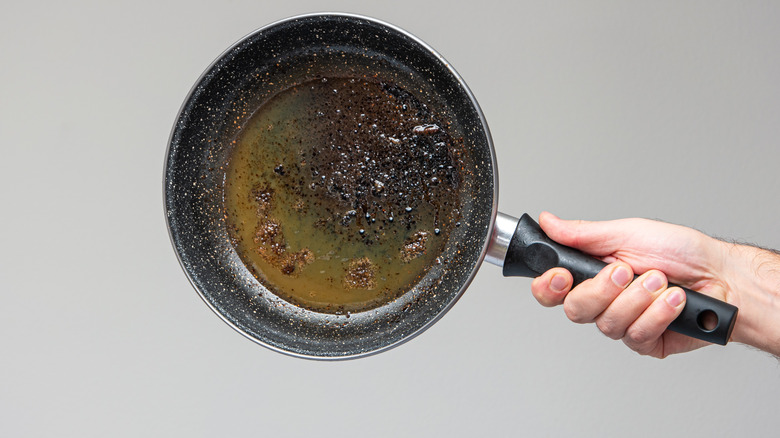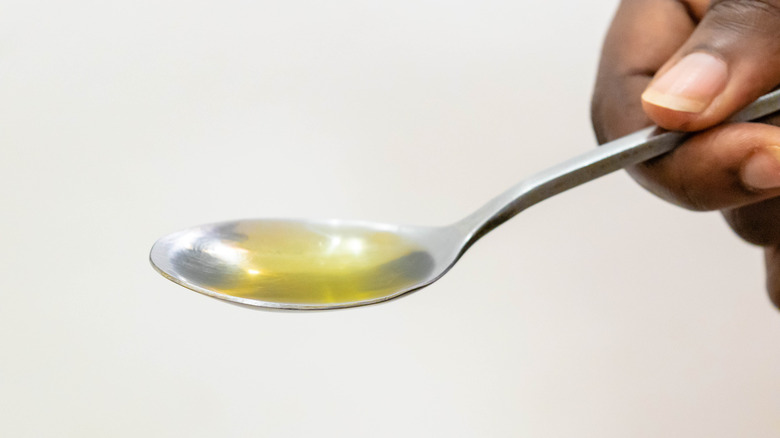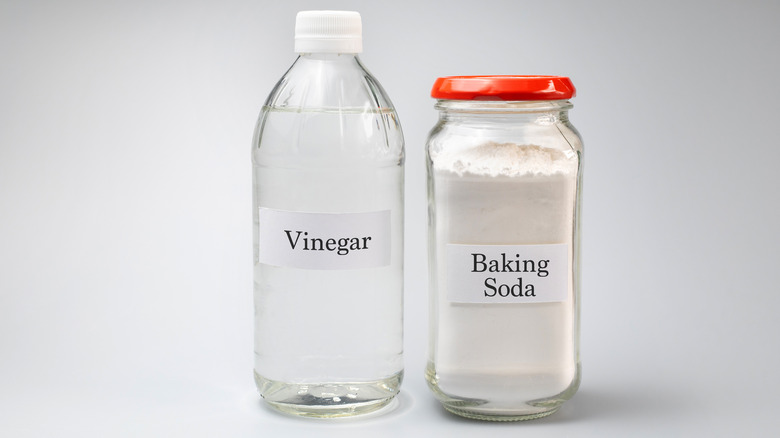What Happens If You Put Grease Down A Garbage Disposal?
Most of us have heard the age-old saying, "Don't pour cooking grease down the kitchen sink!" But have you stopped to ask yourself why? Perhaps you've been adhering to this unofficial rule — or if you're like many people, you've been washing off any greasy cooking residue in your sink with that tiny voice in the back of your head niggling at you to dispose of it elsewhere. According to Day & Night, when we're talking about grease, we mean all things oil-based, including lard, vegetable oils, butter, and shortening. Oils can be liquid or solid at room temperature but typically turn to liquid once heated.
It's more than tempting to pile a bunch of greasy dishes into the sink and either wash them right then and there or rinse them off to let your dishwasher do most of the heavy lifting. But what really happens after that cooking oil makes its way into your garbage disposal and kitchen pipes? The answer may be a bit grosser and more worrisome than you think.
Don't pour grease down the sink
There's a reason we're told our entire lives that cooking grease should never be disposed of via the drain in your kitchen sink (or any other pipes in your home). Home Serve reports that the consequence of doing so is pretty simple — all that grease builds up over time in your pipes and can cause blockages. If you have a garbage disposal, the grease will accumulate around the blades and reduce its ability to grind properly before clogging the pipes leading out from the sink.
Unlike water or other non-oil-based liquids, the grease doesn't make its way through your pipes and out into the greater sewage systems where you live (although if it does make it that far, it causes the same issues on a larger scale). You'll notice that when most oil-based substances cool to room temperature, they become solid, including butter, shortening, and animal fat. The same process takes place inside your pipes when you wash grease down your drains.
If you make pouring grease down your kitchen sink a regular habit, eventually you'll realize that your sink isn't draining water as quickly as usual, and that water may even pool in the sink basin for several minutes before fully draining. Unfortunately, a simple call to a plumber may not be the easy fix you're hoping for if this happens. In extreme cases, someone will need to replace your pipes and garbage disposal entirely, which can get pretty pricey.
How to properly dispose of cooking grease
American Home Shield offers simple solutions for properly disposing of cooking oils that will save you from the costly repairs of a new garbage disposal and pipes. If you're working with an oil-based substance that solidifies at room temperature, simply let the substance cool completely once you've finished cooking. You can then scrape the solidified bits into a regular garbage can without worrying about leaks. If the cooking oil is liquid, such as most vegetable oils, you'll want to designate a bottle or can as a container to collect the used oil. Many people prefer to keep this can under their kitchen sink and continuously add to it until it is full. You'll want some sort of lid for this container as once it's full, you can simply toss it into your kitchen trash.
In the case of larger quantities of used oil, you'll first determine if the oil can be reused or if it needs to be disposed of. For example, frying a batch of French fries may not leave the cooking oil dirty, so it can be safely reused. If you do need to get rid of the used oil, you should pour it into an appropriately sized container and take it to your local collection facility for recycling. Your primary goal is to always dispose of any amount of grease and oil outside of your kitchen sink, even if that means soaking up stubborn residue with a paper towel.
What to do if you've poured grease down your garbage disposal
While you should always make sure to dispose of grease and oil before washing your dirty cookware, rest assured that there are a couple of DIY solutions for reducing the damage caused to your garbage disposal and pipes in the case of accidentally pouring grease down the kitchen sink. Gillece outlines a simple solution that involves the cleaning power of two ingredients you likely already have on hand: vinegar and baking soda. The chemical reaction caused by these two substances works to break down any solidified grease in your pipes without damaging the pipes themselves.
You shouldn't hesitate to remedy the situation after pouring grease down your drain to avoid giving it time to solidify and cause clogs. First, pour several cups of hot water down your kitchen sink drain, followed by a mixture of baking soda and vinegar. Let the baking soda and vinegar work their magic before following up with another hot water wash. The hot water will prevent any liquified grease from becoming solid again.
If you are already experiencing clogs, you may need to repeat this procedure more than once and possibly even snake the drain or use a sink plunger to break up the clogs. You should avoid chemical-based products designed to unclog drains as they are corrosive and can melt or warp your garbage disposal and pipes, depending on the materials present in their composition, as per S & D Plumbing.



